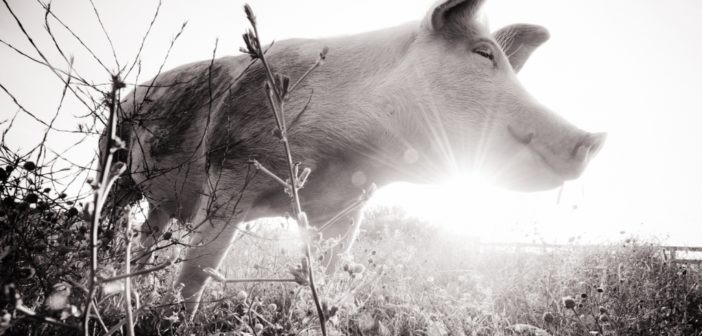Any time of year is perfect for ditching animal products – but January offers the incentive to try something new, and there are lots of good reasons to give it a go. Here’s 5 reasons why you should consider trying veganism in 2019.
1. It’s kinder to animals
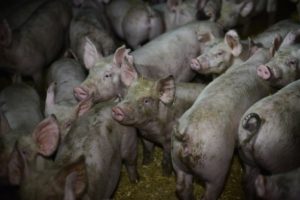
Young pigs in crowded conditions at a large pig farm in Australia. Image credit Jo-Anne McArthur / We Animals.
If you love animals and hate the thought of them suffering, then adopting a plant-based diet is certainly for you. Every year, more than 60 billion land animals and countless marine animals are slaughtered for consumption, globally. The majority of these animals will have spent their short existence on a factory farm, where they are confined to packed sheds or cages, where many of their natural instincts are denied, and where disease and mortality are commonplace. The suffering these animals go through doesn’t stop there. Regardless of whether the animals are raised on intensive farms or “free-range”, or “pasture-raised” systems, they all suffer a brutal and terrifying death at the slaughterhouse.
By going vegan, you will be able to remove your support for these cruel practices.
2. It’s better for the planet

An image of our beautiful planet from space. Image credit NASA Goddard Space Flight Center, CC BY-SA 3.0.
The planet is in a desperate state. Experts have said that we have as little as 12 years left to limit some of the worst effects of climate change. What does this have to do with veganism? Well, animal farming is one of the biggest causes of greenhouse gas emissions, deforestation, fresh water use and water pollution. The production of meat and dairy is responsible for around 14.5% of all greenhouse gas emissions, which is more than all motorized transport combined. For example, 100 grams [3.5 ounces] of beef produces an average of 105 kilograms [231 pounds] of greenhouse gases, whereas 100 grams [3.5 ounces] of tofu produces less than 3.5 kilograms [8 pounds].
One study into the environmental impacts of meat production not only found that a plant-based diet was the most sustainableoption, but resulted in the lead researcher, Joseph Poore, going vegan and saying, “A vegan diet is probably the single biggest way to reduce your impact on planet Earth, not just greenhouse gases, but global acidification, eutrophication, land use and water use […] [Its impact] is far bigger than cutting down on your flights or buying an electric car.”
As consumers we have the ability to choose food that does the least damage to the environment, and most plant-based products are indeed the best in this regard.
3. It’s healthy
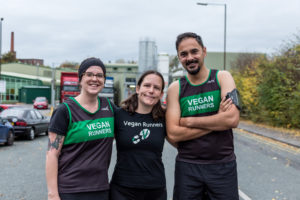
These vegan runners are fueled by plants. Image credit Vladimir Morozov, CC BY-SA 3.0.
There are many health myths surrounding a vegan diet. If people know you are vegan, someone will inevitably ask you where you get protein or B12. However, every major dietitian association agrees that well-planned vegan diets can provide all of the nutrients one needs to be healthy. The American Academy of Nutrition and Dietetics, which is the largest organisation of dietitians in the world says: “Appropriately planned …vegan diets are healthful, nutritionally adequate, and may provide health benefits for the prevention and treatment of certain diseases. [Vegan diets] are appropriate for all stages of the life cycle, including pregnancy, lactation, infancy, childhood, adolescence, older adulthood, and for athletes. …Vegetarians and vegans are at reduced risk of certain health conditions, including ischemic heart disease, type 2 diabetes, hypertension, certain types of cancer, and obesity.” A similar position is taken by the British Dietetics Association and the National Health Service (NHS).
As with every diet, it is important to know what foods to eat in order to meet your nutrient needs. There is a lot of information about eating a healthful vegan diet, which makes this so much easier. I highly recommend The Vegan RD and Jack Norris RD. You can also find lots of useful nutritional information in Animal Aid’s ‘Guide to Going Vegan.’
4. It can help your bank balance
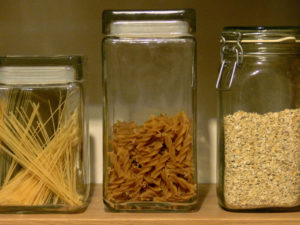
Many vegan staples, such as pasta, grains, and other dry goods, are very economical choices. Image credit John Davey, CC BY-SA 3.0.
Whilst some may view veganism as being more expensive than non-veganism, this doesn’t have to be the case. Of course, if you’re splashing out on the fancier meat-alternatives (which can be delicious, by the way!) or buying products such as vegan Ben & Jerry’s regularly, you may end up spending more. But it is important to note that some of the cheapest foods on the planet are plant-based. I’m talking about beans, legumes, whole grains, fruits and vegetables (opting for frozen may be an option if you are on a tighter budget), potatoes, rice, and other plant-based whole foods. You can make simple, delicious and nutritious meals using cheap ingredients that not only help the planet and animals, but also save you money. Jack Monroe has a number of cheap vegan recipes on his Cooking on a Bootstrap website and there’s also the £1.50 Vegan website, just to name a few.
5. It’s never been easier!
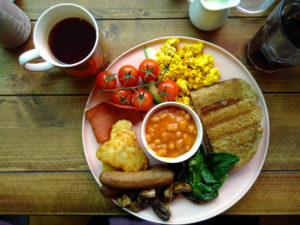
A vegan full English breakfast. Image credit Danstowell, CC BY-SA 3.0.
Finding vegan alternatives to your favorite foods has never been easier. Whatever your favorite foods are now, I can guarantee you will find plant-based versions of them that are as delicious. In every supermarket and health food shop you are guaranteed to find a whole host of vegan options, including a wide range of plant-milks, vegan cheeses and more. Not to mention, almost every major chain restaurant offers vegan options and most others are more than happy to accommodate.
So why not help animals and the planet and try veganism? You can order a free ‘Go Vegan’ pack from Animal Aid, or perhaps try veganism for the month of January by signing up for Veganuary.
This article was written by our Vegan Outreach Campaign Manager Tod Bradbury and first published on Plant Based News.
Featured image: Jane the pig at sunset at Farm Sanctuary in New York. Pigs like Jane are killed in staggering numbers to feed meat-eaters. Image credit Jo-Anne McArthur / We Animals.

